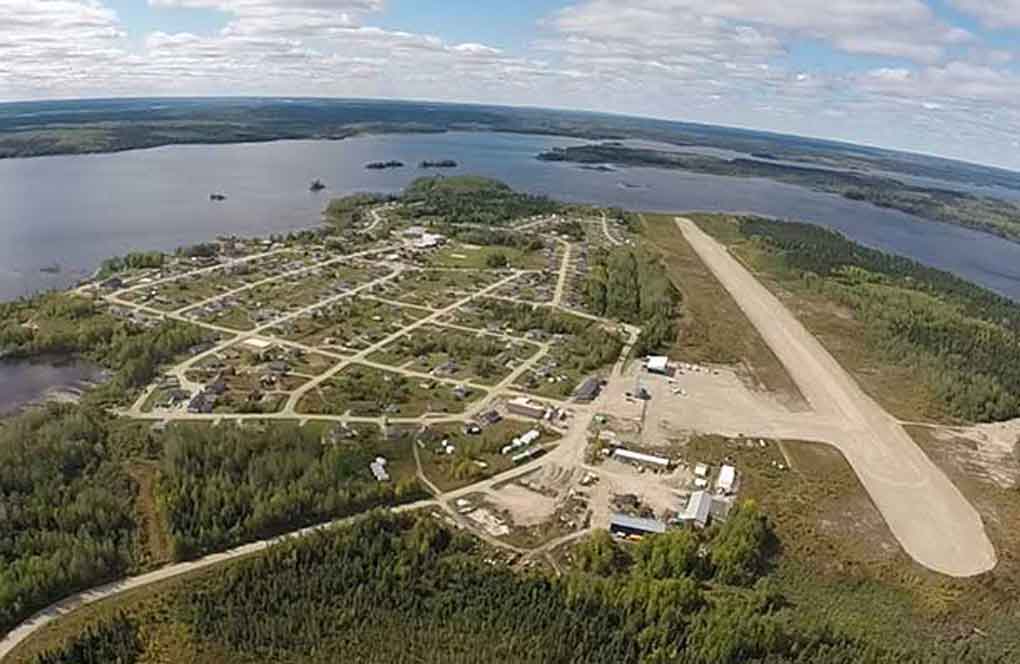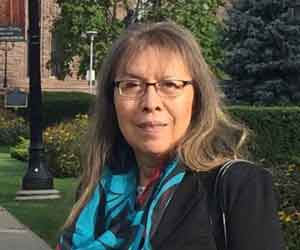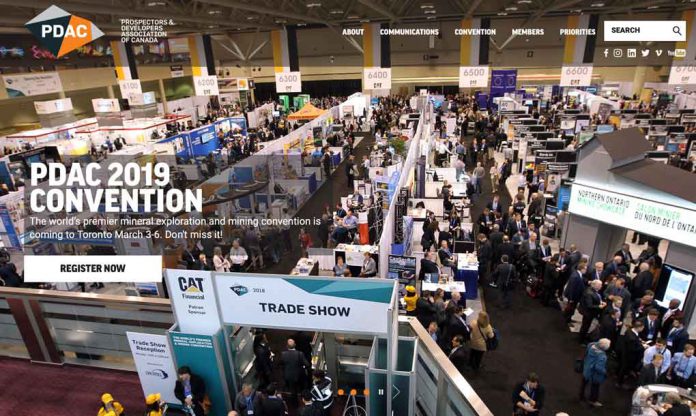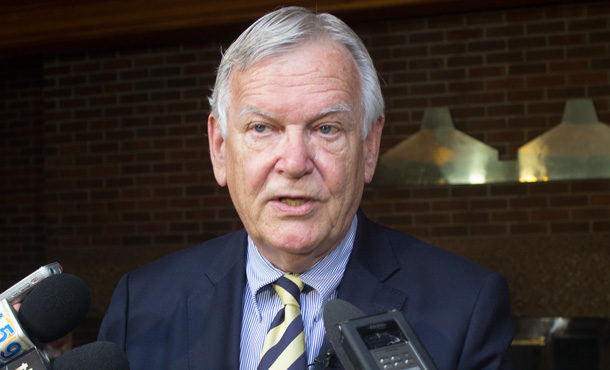Eabametoong First Nation – INDIGENOUS – This is the first time in the past five years when I’m not attending PDAC.
The annual Prospectors and Developers Association of Canada convention is the largest event of its kind in the world. This is the big show for mining firms, financiers, and junior companies trying to make their next big play. Over 24,000 people attended in 2017; it is a big show. It is also the venue of choice for Ontario’s big announcements or Federal investments on mining, and the buzz around Ring of Fire topics has always drawn hundreds of onlookers to panel discussions. It is, however, a more receptive crowd to miner’s dreams than an Ojibway Grandmother’s truth. It is time for more truth-telling.


As Chief of Eabametoong First Nation, I have attended mostly to learn about the mineral industry and to participate in Matawa Chiefs Council events and meetings often held prior to the convention. In past years, some of these meetings have been important sessions on the Ring of Fire Regional Framework Agreement negotiations or meetings with senior government officials regarding the ongoing stewardship of EFN territory and establishing ways our community will be involved in future projects. There have even been announcements about funding for road studies, possible regional governance arrangements and partnerships for joint decision making. Not this year.
Oh, I’m sure some announcements will come. Perhaps Minister Rickford and his ‘proponent’ communities will be talking further about future roads and narrowly scoped assessment processes for the Ring of Fire – but that is just a guess.
What deserves careful reflection among the public and industry, however, is the question – what has Premier Ford and his government accomplished? It is hard to say, since so little real information is available to anyone, and I’m a Chief of a community with rights in the area.
What is clear to me is the inaction of this government have been very disappointing. Despite a diplomatic and welcoming letter signed by all nine Matawa Chiefs, which included an explicit request to continue regional discussions on the Ring of Fire from the Matawa Chiefs Council in July, Premier Ford has not yet responded other than saying Minister Rickford would follow up with a meeting. That was on August 9th.
Despite the good faith efforts of the Matawa Chiefs to pursue meetings with Minister Rickford via formal letters in October and December, still nothing. EFN reached out to his Deputies and put forward a number of proposals for discussion. I even attended and registered questions for follow up via Question Period at Queen’s Park in September to promote action on our regional table. Part of that was to proactively suggest options for reconciliation on the permitting court case that EFN won in July. No response.
When I heard that Minister Rickford was going to address the Chiefs of Ontario at our November meeting, I had a few questions for him that day which generated some attention, and publicly called for a direct meeting… no, follow up again.
Finally, Minister Rickford called me after hearing that one of my Council Members passed away in January and suggested we meet for dinner. No dinner was scheduled, but he made sure to mention our brief call to an industry event and media that week; no doubt suggesting we have a positive relationship.
So what’s the big deal? Ford is too busy to respond and Rickford is apparently disinterested until he has some other arrangements settled with the communities he is choosing to engage with.
Well, it appears that Ontario is ignoring their commitments to the historic Regional Framework Agreement and Matawa Jurisdiction table processes. These tables involve negotiations that Ontario has simply stopped participating in, but as yet without giving notice to Matawa of termination. These discussions provide for the development of a much-needed agreement on a suite of environmental, infrastructure, community wellbeing, revenue sharing and decision-making objectives and principles that were identified by all parties.
Why are these regional negotiations needed?
First, the Crown decision-making processes in place for environmental assessment, exploration, and mine permitting simply do not acknowledge the Aboriginal and Treaty rights held by EFN other First Nations in the region and integrate them fairly into practice in the spirit of the Treaty.
Second, it is not in the interest of EFN or any of our communities for Ring of Fire processes to lead to protracted and acrimonious legal battles. We know the situation and want to pursue a positive solution. After just winning an important case against an exploration permit where it should never have been allowed, I can say it was a painful exercise and do not wish that for these proposed mega-projects like what is going on with Trans Mountain in BC. However, the reality is all roads to the Ring of Fire go through the territory of Matawa First Nations, and Eabametoong and Neskantaga in particular. Just a few months ago, we at least had a government that recognized some of the issues an acknowledged that without a strong regional and community-driven package of agreements on the Ring of Fire, nothing is happening in the north. Now, we have no communication at all… how is that helpful?
Thirdly, there is a growing understanding among industry, government, and experienced practitioners that the ‘status quo’ approach to resource decisions is not working. In addition to market cycles and instability, mineral resource tenure and political stability are major factors (and serious risks) to investment. This is especially true in globally-significant landscapes and areas rich with Indigenous rights. For example, even Garry Clark from the Ontario Prospectors Association noted that the EFN v. MNDM case “would be a good starting point for the new government…to revamp the consultation process and maybe even the permitting process.” Notably, Mr. Clark had meetings already scheduled with Minister Rickford.
Given the challenges of navigating relationships with Indigenous rights holders, developing appropriate environmental protections, and facilitating economic development, it is vital that governments appreciate their role in either enabling or preventing resource conflicts. The EFN v. MNDM decision illustrated the provocative role played by the MNDM and Landore in the consultation process. A recent report funded by the Canadian International Resources and Development Institute (CIRDI) and United Nations Development Program (UNDP) noted that,
“In essence, governments construct the garden, prepare the soil, plant the seeds and tend the garden, from inception through to maturity, and through their actions and non-actions produce the fertile ground for sustainable development or sustained conflict.”
The Andrews et al. report identifies important governance issues among resource-based economies, typically in less developed countries (see pp.16-18). Unfortunately, many of these weaknesses persist in Ontario where the lack of ‘tending the garden’ or any proactive steps towards reconciliation and recognition of Aboriginal and Treaty rights in reforming the mineral development process result in conflicts that simmer under the surface and often emerge white-hot during permitting and environmental assessment processes. That was the case with both the Cliffs and Noront EAs for their proposed Ring of Fire projects, and what led the Matawa First Nations to pursue a negotiated regional process to develop better terms of involvement in these vital decisions on our lands.
Just last week, a MacDonald Laurier Institute report drew further attention to the ‘uncertainty and confusion’ in Canada’s natural resource development. While EFN disagrees with some of the points made in this report, it is important to note the depth of concern that this think tank has for the role of consultation with First Nations and fears around the implementation of UNDRIP within Canada. The author made backhanded criticisms of EFN community values and interests in protecting certain areas rather than advancing gold exploration but also identified that the Ring of Fire area could very easily be mired in similar complex legal challenges now facing the Trans Mountain pipeline.
So, what should be done? And what are the risks of inaction?
Simply put, there is a dramatic need for Ontario to return to good faith negotiations with EFN and our fellow Matawa-member First Nations.
EFN has long been one of the most progressive nations in the area. In 2002 we established a Memorandum of Cooperation with Ontario that guided relationships and led to exploration agreements and projects in areas that were acceptable for activity. Furthermore, our community was in the middle of advancing the next-stage Memorandum of Partnership with Ontario in early 2016 that was focused on developing a new approach to consultation, when the MNDM unilaterally abandoned dialogue with EFN and simply issued permits to Landore, leading to a lengthy and bitter Judicial Review where the court quashed the permit and found the process was,
“…not reflect[ing] a genuine desire to engage in real, straightforward and honest consultation… Fundamentally, the Ministry’s conduct cannot reasonably be considered to be the type of conduct that would promote reconciliation between the Crown and Indigenous peoples. That requires managing the consultation process in a way that fosters trust as opposed to misunderstanding and betrayal… ”
We have invested tremendous community effort and resources into developing principles with our neighbouring communities and options to discuss with Ontario, and there is a clear case for developing an effective consultation and decision-making approach in our territory. We would all benefit from a regime of understanding and certainty that works for First Nations, government, and industry.
Why do areas like the NWT, Yukon, and Nunavut now score better than Ontario in investment attractiveness? They have taken important steps towards respecting Indigenous rights and working with communities, whereas Ontario appears to be moving the other way.
Yet Minister Rickford and his staff appear to be fostering further confusion and pushing conflict off for another day by funding our neighbouring First Nations to consult with us on possible roads to the Ring of Fire, and refusing to take meetings. It is hard to imagine that working out well. Back in 2014 when he was a Federal Minister for Economic Development in Northern Ontario, he openly criticized Minister Gravelle for not reaching agreements with EFN and Matawa First Nations on revenue sharing faster. Those agreements were possible through active regional negotiations, and now that Rickford is our provincial Minister he has the power to strike such deals (like those announced with Wabun Tribal Council), but it is hard to do so without any engagement.
We now have news of the proposed repeal of the Far North Act and further confusion in the legal landscape within the north. While the EFN community-based land use planning process is among those expected to continue, there is no clarity yet on the legislative authority that our Taashikaywin Plan will stand upon. Further, despite EFNs understanding of the differing views about the Far North Act and its imposition back in 2010, we have moved forward with land use planning exactly to avoid future resource conflicts, in this one section of our territory as a starting point, and put forward our community’s vision of balanced environmental and community development goals. According to EFN members, that necessarily involves certain areas of lands being off limits, but development in other areas is possible if the community is integrated into decision making and proposals conform to principles in the land use plan.
As I have stated, and our community has shown, EFN is a strong and progressive community of principled and forward-thinking members. The old Fort Hope band was the traditional leader of many of the current Matawa First Nations (Webequie, Nibinamik, and Neskantaga) that signed treaty at Fort Hope, and it appears that principled leadership can be a costly and, at times, lonely challenge.
We are committed to a sustainable and prosperous vision of the future, as evidenced by our negotiation proposals to Ontario and will not reverse strong community-developed principles. For an entire generation, our people have engaged in various road and community development plans and processes. Of course, we want road access and associated economic development opportunities. However, we will not be easily pushed to accept serious impacts to our lands and future of our way of life without appropriate measures developed and agreed upon by our people with other governments.
Really, our community position is simple. Ontario currently excludes us from vital information and a genuine decision-making role on projects that will impact our rights and lives. We have clearly stated that we need to be involved meaningfully, which means access to information so we can make wise choices, and to be afforded the respect to be involved jointly in decisions on our lands in the spirit of the Treaty. That would create an improved regime (for all) where relationships are honoured, good projects could move forward appropriately, and unwise proposals would be rejected or need to be revised.
So why not attend PDAC?
I believe the ideas of our community are too honest and progressive to be understood in that crowd. I am staying at home to advance our community development projects and priorities. We have work to do, and Minister Rickford has my number and was invited to visit EFN back in October.
Chief Liz
The views, opinions, and positions expressed by all columnists and contributors are the author’s alone. They do not inherently or expressly reflect the views, opinions and/or positions of NetNewsLedger.






